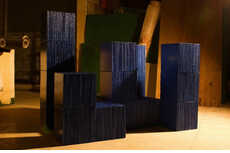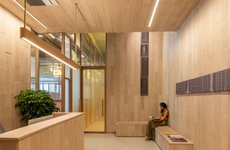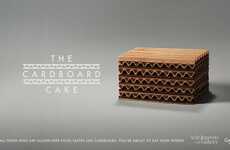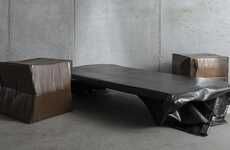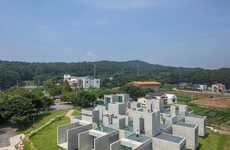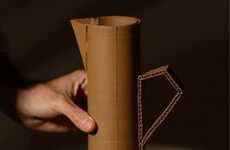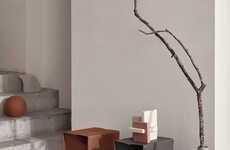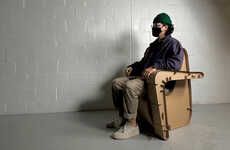
The 'Cardboard' Cafe in Mumbai is Constructed with an Eco-Friendly Material
Laura McQuarrie — April 15, 2019 — Eco
Indian architecture studio Nudes designed the 'Cardboard' cafe in Mumbai with an unconventional yet eco-friendly material, the same one that the cafe shares its name with. While the core, shell and service components of the cafe are constructed from other materials for the sake of structural integrity and function, the remainder of the cafe—from its seats to the sculptural walls—is entirely shaped by the low-cost corrugated material.
By piecing layers and layers of cardboard atop one another, Nudes successfully created uniquely shaped chairs, lighting fixtures and large-scale wall installations. This modern and eco-friendly cafe was created to show how durable and versatile cardboard can be as a biodegradable material.
For the sake of longevity, the tabletops within the space feature a wax treatment to prevent water from being absorbed and to support daily maintenance.
By piecing layers and layers of cardboard atop one another, Nudes successfully created uniquely shaped chairs, lighting fixtures and large-scale wall installations. This modern and eco-friendly cafe was created to show how durable and versatile cardboard can be as a biodegradable material.
For the sake of longevity, the tabletops within the space feature a wax treatment to prevent water from being absorbed and to support daily maintenance.
Trend Themes
1. Cardboard Architecture - The trend of using cardboard as a construction material in architectural design presents disruptive innovation opportunities for sustainable and cost-effective building solutions.
2. Eco-friendly Design - The growing trend of eco-friendly design in the hospitality industry offers disruptive innovation opportunities to create sustainable and socially responsible businesses.
3. Biodegradable Materials - The increasing adoption of biodegradable materials like cardboard in various industries opens up disruptive innovation opportunities to develop environmentally friendly products and services.
Industry Implications
1. Architecture - The architecture industry can explore disruptive innovation opportunities by incorporating cardboard as a sustainable and cost-effective material for building construction.
2. Hospitality - The hospitality industry can benefit from disruptive innovation opportunities by embracing eco-friendly design principles and incorporating sustainable materials like cardboard in their establishments.
3. Manufacturing - The manufacturing industry has the potential for disruptive innovation by exploring biodegradable materials like cardboard as alternatives to traditional materials, leading to more environmentally friendly products.
6.4
Score
Popularity
Activity
Freshness


